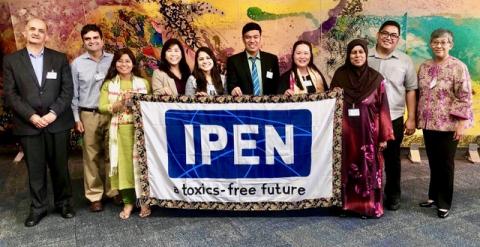IPEN POs Emphasizes Civil Society Role in the Elimination of Lead Paint in Asia-Pacific

Bangkok, Thailand - IPEN Participating Organizations (POs) from Jordan, Bangladesh, Pakistan, Indonesia, Malaysia and Vietnam actively participated in a regional workshop for Asia-Pacific promoting regulatory and voluntary actions by government and industry to phase out lead in paint. Completing the 10-member civil society delegation were the IPEN regional coordinators for South Asia (SA) and Southeast and East Asia (SEA) and the IPEN Global Lead Paint Elimination Campaign team.
Held in Bangkok, Thailand on August 21-22, 2019, the workshop was conducted in support of the Global Alliance to Eliminate Lead Paint under the auspices of the “Global best practices on emerging chemical policy issues of concern under the Strategic Approach to International Chemicals Management" (SAICM) funded by the Global Environment Facility (GEF).
Among the participants were environment, health and trade officials from the governments of Lebanon, Jordan, Bangladesh, Pakistan, Cambodia, Laos, Vietnam, Malaysia, China, Mongolia and Fiji; paint industry representatives from Malaysia and the Philippines; NGOs from the IPEN network; and the GEF-SAICM Lead Paint Project Executing Partners and Advisers from the United Nations Environment Programme (UNEP), World Health Organization (WHO), US Environmental Protection Agency (EPA), American Bar Association-Rule of Law Initiative (ABA-ROLI), and IPEN.
The lead in paint component of the said GEF-SAICM project aims to work with governments to support the development and implementation of lead paint laws in 40 countries, as well as to work with 50 small- and medium-sized enterprises (SMEs) in eight countries to promote the phase-out of the use of lead additives in production processes.
At the workshop, IPEN gave prominence to on-the-ground strategies and experiences in eliminating lead paint, including generating publicly available lead paint data, conducting awareness-raising and media activities, actively engaging with industry players, and promoting multi-stakeholder collaborations. The team pointed out that the data generated by civil society using internationally-recognized scientific methods, provided evidence of the problem requiring regulatory and industry actions.
The workshop sessions featured presentations and discussions that clarified the health, environmental and economic impacts of lead paint, the rationale for eliminating lead paint and the need for effective laws, regulations and standards to make it happen. Participants were provided an overview of the available advice and tools from the Lead Paint Alliance, including the Model Law and Guidance to Regulate Lead Paint, through the lead paint component of the GEF-SAICM project.
Participants also learned about the practical steps in developing regulatory approaches for the elimination of lead in paint, learning about several multi-stakeholders’ successes in developing a lead paint laws which underscores the role of the civil society in raising societal awareness and support for eliminating lead paint.
IPEN had the opportunity of sharing the civil society experiences in engaging and assisting SMEs in phasing out lead in paint. Experiences in government and civil society collaboration and cooperation with the paint industry were likewise shared by the representatives of the Malaysian Paint Manufactures' Association (MPMA) and the Philippine Association of Paint Manufacturers (PAPM).
The workshop concluded with the participants discussing in breakout groups the next steps toward the development of lead paint laws in their respective countries and sub-regions.
